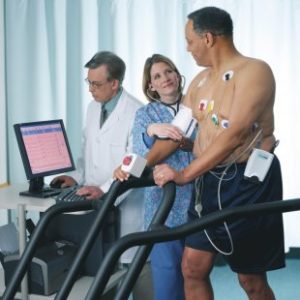 What is Exercise Stress Test?
What is Exercise Stress Test?
An Exercise Stress Test, sometimes called a treadmill test or exercise test, helps Dr. Villa find out how well your heart handles work. As your body works harder during the test, it requires more oxygen, so the heart must pump more blood. The test can show if the blood supply is reduced in the arteries that supply the heart. It also helps Dr. Villa know the kind and level of exercise appropriate for a patient.
How the Stress Test is Performed
You will walk on a treadmill while the electrical activity of your heart is measured with an electrocardiogram (ECG), and blood pressure readings are taken. This will measure your heart”s reaction to your body”s increased need for oxygen.
The Stress Test test continues until:
- You reach a target heart rate.
- You develop complications such as chest pain or an exaggerated rise or drop in blood pressure.
- ECG changes show that your heart muscle is not getting enough oxygen
- You will continue to be monitored for 10 – 15 minutes after exercising, or until your heart rate returns to baseline
How to Prepare for the Stress Test
- You must not eat, smoke, or drink beverages containing caffeine or alcohol for 3 hours (or more) before the test.
You should continue all medications unless instructed otherwise (several types of medications are often avoided before an exercise stress test).Wear comfortable shoes and loose clothing to allow you to exercise. - Tell Dr. Villa if you are taking sildenafil citrate (Viagra) and have taken a dose within the past 24 hours. This is necessary because nitroglycerin, which is sometimes given during a stress test to relieve chest pain, should not be given to a person who has recently taken Viagra. The combination can cause a serious drop in blood pressure.
How the Stress Test Will Feel
Electrodes (conductive patches) will be placed on your chest to record the heart”s activity. The preparation of the electrode sites on your chest may produce a mild burning or stinging sensation.
The blood pressure cuff on your arm will be inflated every few minutes, producing a squeezing sensation that may feel tight. Baseline measurements of heart rate and blood pressure will be taken before exercise starts.
You will start walking on a treadmill. The pace and incline of the treadmill will gradually be increased.
Rarely, people experience the following during the test:
- Chest discomfort
- Dizziness
- Palpitations
- Shortness of breath
- Why the Stress Test is Performed
Dr. Villa may recommend an exercise stress test to:
- Diagnose coronary artery disease.
- Diagnose a possible heart-related cause of symptoms such as chest pain, shortness of breath or lightheadedness.
- Determine a safe level of exercise.
- Check the effectiveness of procedures done to improve coronary artery circulation in patients with coronary artery disease.
- Predict risk of dangerous heart-related conditions such as a heart attack.
- Depending on the results of the exercise stress test, the physician may recommend more tests such as a nuclear stress test or cardiac catheterization.
Normal Results of a Stress Test
Normally, heart rate increases in proportion to the workload. Your endurance levels should be appropriate for your age and conditioning level.
What Abnormal Stress Test Results Mean
Abnormal results may indicate:
- Arrhythmias during exercise
- Lack of aerobic fitness
- Possible coronary artery disease (blockage in the arteries)
- Stress on the heart triggered by exercise
- Risks of a Stress Test
Stress tests are generally safe. Some patients may have chest pain or may faint or collapse. A heart attack or dangerous irregular rhythm is rare.
Persons who are likely to have such complications are usually already known to have weak hearts, so they are not given this test.
